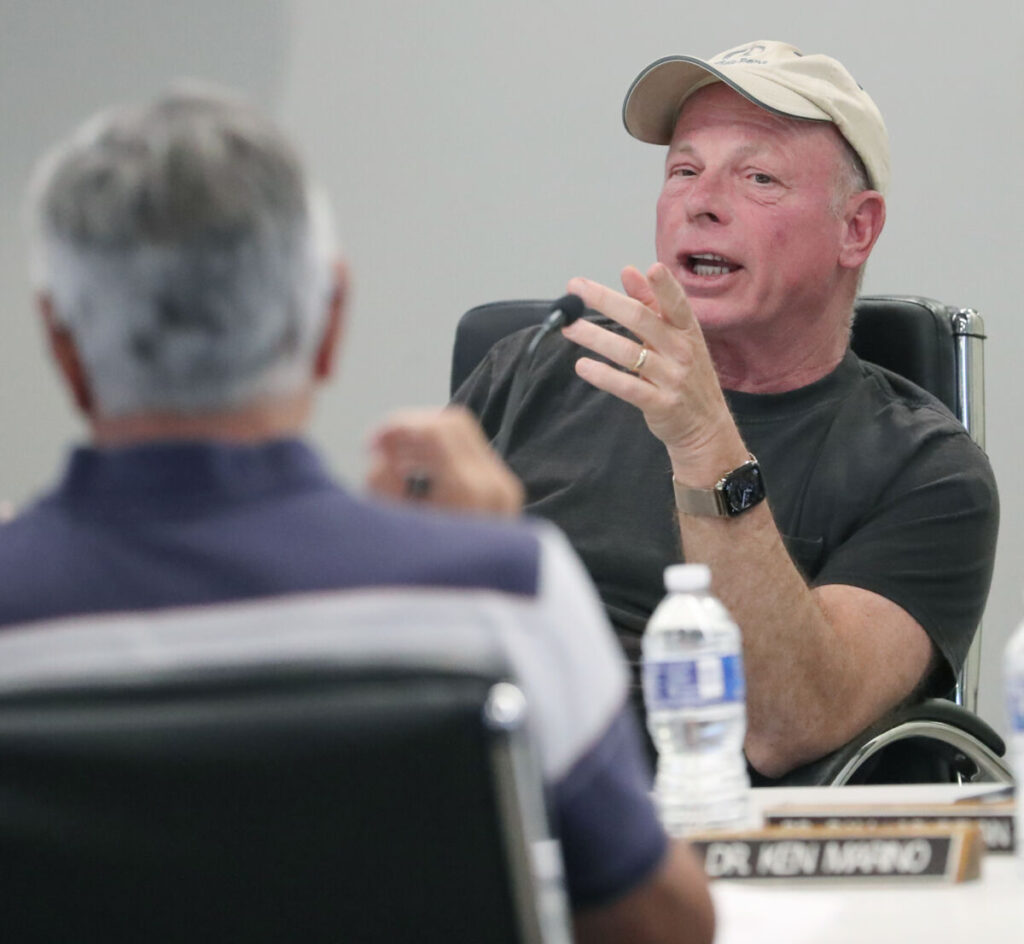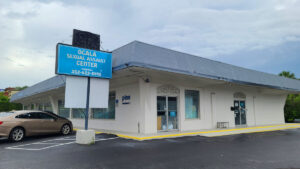MCHD trustees to discuss creating a low-barrier homeless shelter in Ocala

Rich Bianculli speaks during a meeting of the Marion County Hospital District on East Silver Springs Boulevard in Ocala, Fla. on Monday, March 25, 2024. [Bruce Ackerman/Ocala Gazette] 2024.
During a March 25 Marion County Hospital District meeting a trustee offered to transfer a contract to purchase a building to the district which could eventually be used to meet the increasing demand for housing the homeless.
Although the topic was not on the meeting agenda, Rich Bianculli told his fellow trustees the board should include serving the homelessness as a pillar initiative of the district.
Bianculli pointed to the new law recently signed by Gov. Ron DeSantis that prohibits homeless people from sleeping on public property. The law has left communities across the state wondering how they will fund solutions to their homeless situation and how they will enforce the measure when it goes into effect on Oct. 1.
To meet the growing need for shelter beds, Bianculli proposed that the board take over a real estate contract he had entered into for a building he felt would best be utilized as a low barrier shelter.
Bianculli did not provide the address to the property during the meeting but described the parcel as the “old domestic violence shelter.” The “Gazette” believes the building Bianculli was referencing is located at 2010 Pine Blvd. The domestic violence facility closed when it lost necessary funding last year.

The Ocala Domestic Violence/Sexual Assault Center is shown on South Pine Avenue in Ocala, Fla. on Monday, July 24, 2023. [Bruce Ackerman/Ocala Gazette] 2023.
The contract Bianculli referenced was not attached to the agenda, and attorney Robert Batsel, who represents both the MCHD and Bianculli, said the contract is not public record and therefore he would not provide a copy of it to the “Gazette.”
During the meeting, Marion County Commissioner Michelle Stone praised the intent of the new law as an effort to ensure the “safety of families.” But she acknowledged that the county was now trying to figure out possible solutions using federal money that flows through the state and counties specifically earmarked to address homelessness.
One of the shortfalls in the community’s efforts to meet the need for shelter beds, Stone pointed out, was that none of the nonprofits had a “low-barrier” shelter, that is, a facility that does not require compliance with a particular set of behaviors or history.
Most, if not all, local shelters require a valid ID and a background check that denies access to those with a criminal history.
Bianculli said there were two buckets of money to discuss regarding his proposal: one was operational dollars and the other was the “$625,000 to close it,” which he said he hoped would come from the county, the city of Ocala and the MCHD.
Bianculli told the trustees and Stone they had approximately 60 days under the contract to close the sale, adding that they would not find a better deal.
The fact that the property the facility sits on favorable zoning was considered a plus. The property is located in a county enclave and not in city limits, however according to the city, “the old women’s shelter behind that property” is within the city limits. The “Gazette” does not know exactly which property in that vicinity is under contract.
According to the city’s website, B-4 zoning allows for a community residential home with a “maximum of 14 unrelated residents per single-family residential dwelling” or a fraternity or sorority house are allowed. Special exceptions can be sought for a boarding house with increased capacity.
Rather than vote on the matter during the March 25 meeting, trustee Harvey Vandeven suggested a workshop be scheduled to decide if the issue of homelessness should be considered as a pilar initiative of MCHD. The MCHD agreed to set a workshop to discuss the matter within the contract’s window.
Bianculli told the trustees he had no intention of making money from the deal but pressured them not to let the opportunity for the property pass them.
When the “Gazette’s” public records request was denied, Batsel wrote the following explanation: “Concerning the content of your request, I spoke with Mac and understand there was discussion of Rich’s contract for purchase of the shelter property and his desire to gain support from the District, County, City, or other government partners that may take an assignment or some other arrangement to effectively have the shelter owned by such partner(s). However, it’s my understanding that no contract was introduced and that neither the District nor anyone on this email has seen the underlying contract. In that case, the contract isn’t a public record of the District (as it was not made or received by the District at all, much less in connection with the transaction of our official business). It’s also my understanding that Rich signed this contract, perhaps with a partner or multiple, individually and not in his capacity as a trustee. As such, I don’t believe we have an obligation (or the ability) to provide the contract you’ve requested. If and when we (or any other public entity) are/is provided the contract, it will be a public record and we’ll have an obligation to provide it upon request.”





